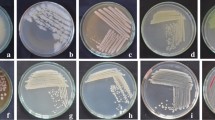Abstract
Bacterization of chick pea seeds with a siderophore-producing fluorescent Pseudomonas strain RBT13 and an antibiotic-producing Bacillus subtilis strain AF1, isolated from tomato rhizoplane and pigeon pea rhizosphere repectively, increased the shoot height, root length, fresh weight, dry weight and yield in soils infected with Fusarium oxysporum f.sp. ciceris. Seed bacterization also resulted in a significant reduction in chick pea wilt caused by the same pathogen. Addition of iron to the soil completely eliminated disease suppression by RBT13 but not by AF1. Dual drug-resistant mutant strains derived from the rhizobacteria were used to monitor and confirm root colonization. The results indicate the potential for development of both strains for the biological control of chick pea wilt.
Similar content being viewed by others
Author information
Authors and Affiliations
Additional information
Received: 29 April 1998
Rights and permissions
About this article
Cite this article
Dileep Kumar, B. Fusarial wilt suppression and crop improvement through two rhizobacterial strains in chick pea growing in soils infested with Fusarium oxysporum f.sp. ciceris. Biol Fertil Soils 29, 87–91 (1999). https://doi.org/10.1007/s003740050529
Issue Date:
DOI: https://doi.org/10.1007/s003740050529




